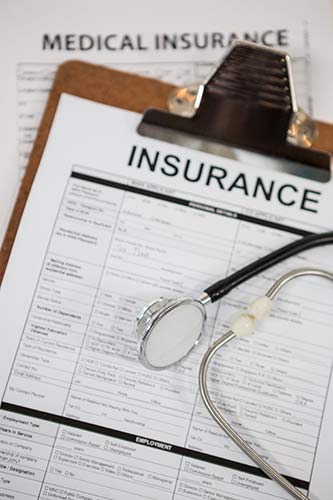
What is considered disability in terms of a disability insurance claim? We’ll go over some commonly covered conditions, and explain how private disability insurance works. And remember, when in doubt, refer back to the documents you got when you purchased the policy. They’ll explain how to file and claim, and who to contact if you need to ask about your specific condition.
➡️ Don’t have disability insurance yet? We can help with that! Call us at (800) 823-4852 to talk to a real person and get help choosing a policy. Or click the button below to request a free quote!
Request a Free QuoteWhat Is Considered Disability by Insurance Companies?
Insurance companies will cover most common injuries and illnesses if a doctor expects them to keep you out of work for your policy’s minimum qualifying time period (often six months or one year). The lists below aren’t comprehensive, but they include the most common reasons people file claims.
Commonly Covered Injuries & Sources of Chronic Pain
- Arthritis
- Broken bones
- Back pain
- Hip, knee, & joint pain
- Spinal injuries
- Nervous system disorders
- Pregnancy and/or childbirth complications – including conditions that do not emerge until after your baby is born. Keep in mind that a normal delivery is not covered.
- Use of hands and/or feet (one or both)

Commonly Covered Illnesses & Conditions
- Diabetes
- Depression
- Cancer or tumors
- Heart, cardiovascular, and circulatory disease
- Vision, speech, or hearing loss
- PTSD

If you’re not sure what is considered disability according to your policy, the fastest way to find out is to call your insurer.
➡️ Don’t have disability insurance yet? We can help with that! Call us at (800) 823-4852 to talk to a real person and get help choosing a policy. Or click the button below to request a free quote!
Request a Free QuoteWhat Is Not Considered Disability by Insurance Companies?
In addition to thinking about what is considered disability, you also have to consider what is not considered a disability. Every insurer has their own limitations and exclusions. But in general, don’t expect them to cover things like:
- Pregnancy or childbirth with no complications
- Some pre-existing conditions (varies by insurer and policy, but often includes mental health conditions like depression and anxiety, or conditions caused by drug or alcohol abuse)
- Injuries that occur while committing a crime
- Injuries that occur while fighting in a war
- Self-inflicted injuries
- Occupational hazards (depends on your job – and keep in mind these would likely be covered by Worker’s Comp instead)

Why wouldn’t they cover these types of disabilities? Think of it as a matter of risk. It’s the insurance company’s job to manage risk. When you applied for a policy, they asked you questions about your salary, your job, and your current health. That was so they could assign a rate to your policy based on the likelihood of paying a claim on your behalf. The point of the policy is to protect you from unforeseen risks – something you couldn’t see coming.

But if you had a pre-existing condition that was extremely likely to cause a temporary or permanent disability, that represents a large risk for them. Plus, you’re probably already under medical care for that condition. It’s not an unforeseen risk, so they do not see it as something you would purchase insurance to cover. If they still offered you coverage, your insurer likely placed a limitation on claims relating to that condition, since it was already established when you bought the policy.
➡️ Don’t have disability insurance yet? We can help with that! Call us at (800) 823-4852 to talk to a real person and get help choosing a policy. Or click the button below to request a free quote!
Request a Free QuoteTotal vs. Partial Disability
In addition to thinking about what is considered disability, you also have to consider whether you are experiencing a total or a partial disability. This will affect the amount of money the insurer pays you. You will be paid more for a total disability than for a partial disability.

Total disability. If you are unable to do the job you did before your disability, that’s called an “own occupation” disability. If you are unable to do any job you are reasonably qualified for after your disability, that’s called an “any occupation” disability.
Partial disability. If you are able to return to some abbreviated form of work, whether it’s your previous career field or not, you can probably still collect some benefits from your DI policy. Some policies include a flat amount, such as 50% of the full disability benefit. Others will look at how much you ‘re able to work and offer a pro-rated amount. For example, if you can safely and comfortably work 10 hours a week (25% of a regular 40-hour work week), that means you’re still unable to work for 75% of a regular work week. Under these rules, you would be eligible to collect 75% of the benefits available for a total disability.
Your doctor will need to sign off on the amount of work you’re able or unable to do. This is not something the insurance company can pay out without their professional opinion. So that’s one more reason to be in contact with your doctor and care team, and follow all their treatment plans. That way, your doctor will be ready to sign off if and when you decide together that it’s time to file a claim.
➡️ Don’t have disability insurance yet? We can help with that! Call us at (800) 823-4852 to talk to a real person and get help choosing a policy. Or click the button below to request a free quote!
Request a Free QuoteHow to Claim Disability Insurance Benefits
Step 1: See a Doctor

If you get sick or hurt and can’t work, the first thing you need to do is see a doctor. Not only do you need that doctor’s care to set up diagnosis and treatment, but you’ll need a doctor’s sign-off to submit your insurance claim. Every insurance claim will need to be submitted with supporting documentation from your medical professional. So don’t ignore the doctor, even if you hope the sickness or injury will go away on its own. If it doesn’t, and you stay out of work, you’ll want to have everything you need to file that claim ready to go.
Step 2: Look Up your Policy Details
Look up your policy’s exclusion period (waiting period) and claim deadline. The exclusion period is the length of time you must wait before any money can be paid out. That doesn’t mean you can’t submit your claim – in fact, you want to start getting that claim ready as soon as your doctor agrees your condition is serious enough to disable you. But you need to be aware of how long it may be before those payments start arriving. Exclusion periods can be anywhere from 30-120 days. Similarly, you need to know the claim deadline period so you know how long you and your doctor have to gather the necessary paperwork.
Step 3: Communicate with Your Employer
Stay in touch with your employer. You will likely need to get a statement from them describing your job duties so the insurance company can compare that with your medical records and confirm that you can no longer work during the course of your disability.
Step 4: Submit Your Claim
Your insurer likely has a claim form available on their website, or through a customer web portal. Your policy documents will also include contact info where you can request a form or ask questions. The claim will ask you to include supporting documentation from your doctor, specialist, or care team. You will also need to provide their contact information, so the insurance company can contact them if they need further information.
Step 5: Monitor Your Claim

Monitor your claim with your insurer until you start receiving benefits. Most claims are processed and completed within 4-6 weeks. If, by chance, your claim is rejected, you can appeal the decision. It might be that what is considered disability doesn’t match what’s in your medical records. Or it may be a matter of providing more detailed medical records to prove the severity of your illness or injury. If your claim is approved, you’ll start receiving payments once the elimination period is over.
Step 6: Update Your Insurer, if Needed
Tell your insurer if your disability status changes. If you return to work, let them know. If you return to work on a limited basis, let them know. If you can’t return to work, you’ll get to collect benefits until the end of your policy’s stated benefit period. In some cases, this can be until you reach retirement age!
Looking for more information on disability insurance? Check out our article here on how a disability insurance policy works.
➡️ Don’t have disability insurance yet? We can help with that! Call us at (800) 823-4852 to talk to a real person and get help choosing a policy. Or click the button below to request a free quote!
Request a Free Quote